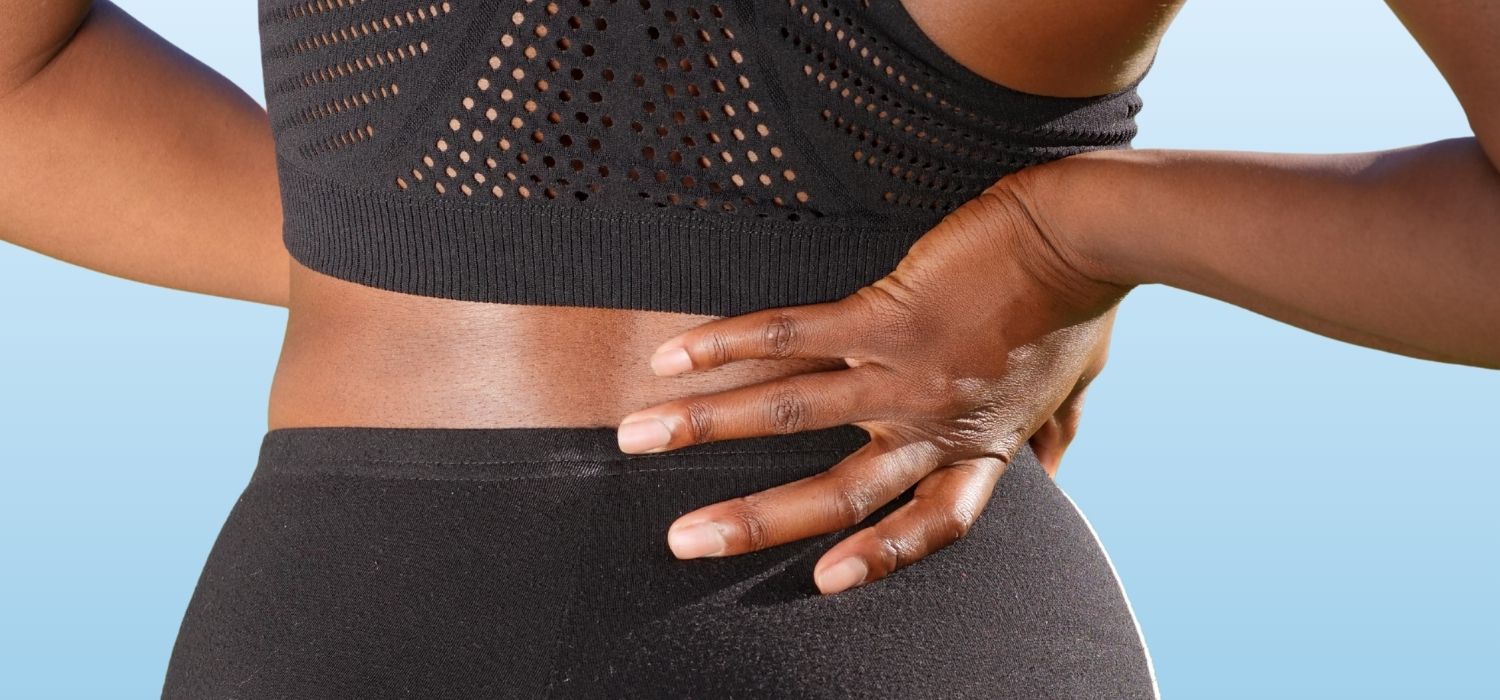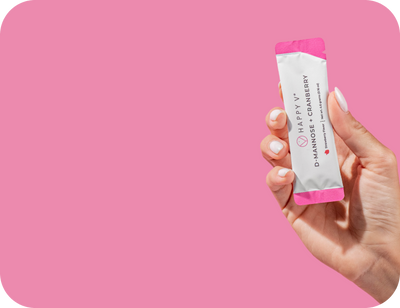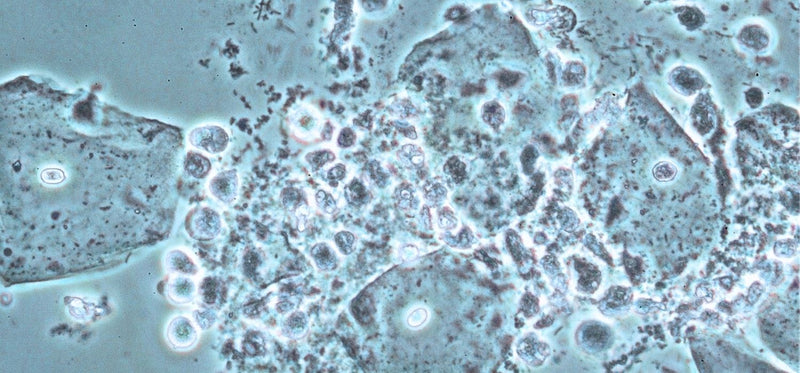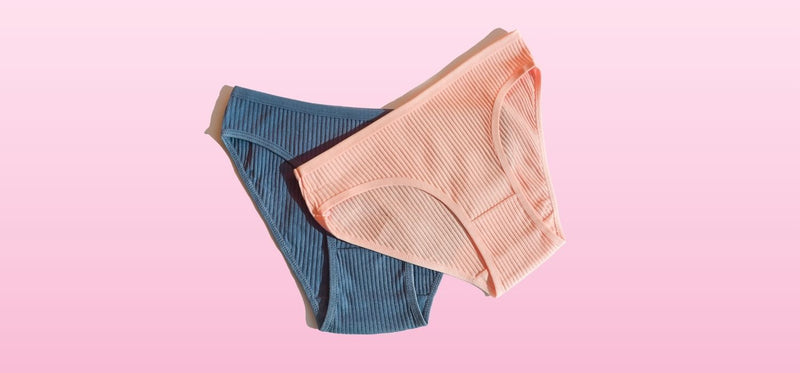
- Fact Checked
- November 19, 2025
- 13 min read
The Link Between UTIs and Back Pain: What You Need to Know
Table of Contents
Table of Contents
We all know the tell-tale signs of urinary tract infection or UTI, right? It’s the terrible burning sensation while you pee and the frequent urge to go… even though you just went. But did you know there is a link between back pain and UTIs? It’s true, and it’s a link that means you need to seek medical attention ASAP.
When a UTI causes back pain, it's a sign that the infection has spread beyond your bladder to your kidneys, which is the most severe form of UTI1. Left untreated, this can lead to serious complications like sepsis or permanent kidney damage2.
Before you panic, remember that everyone's body is different, and not all UTIs lead to back pain. But if you're experiencing new and unexplained back pain alongside urinary symptoms, don't wait it out. Learn how to spot the signs and seek help when needed (no panic necessary).
This post is for informational purposes only and does not constitute medical advice. See full disclaimer below.
How Would a UTI Cause Back Pain?
A urinary tract infection is caused when bad bacteria like E. coli infect a part of your urinary tract3. Usually this infected part is your urethra and/or your bladder, if left untreated, the infection can infect the upper urinary tract—namely the kidneys—causing potential back pain.
The back pain associated with UTIs varies from person to person in terms of the type, location, and severity of the pain. Some people may experience a dull ache or pressure in the lower back, while others may feel sharp pains and spasms. In any case, if you are experiencing new pain you can't explain, call your doctor so they can get to the root cause.
However you experience it, when a UTI spreads beyond the urinary tract like this, it's considered the most severe form of UTI and can be dangerous if ignored. If you are ever experiencing unexplained back pain, please don't try to "suck it up." Seek medical help right away to protect your health—and potentially your life.
Who Is at Risk for Developing Back Pain with UTIs?
Like we said before, anyone who ignores a UTI is at risk of the infection spreading beyond the urinary tract into the kidneys and causing back pain.
But for the 10% of women who get UTIs annually (or even multiple times a year!) there is a greater risk of back pain with UTI, given the sheer frequency of infection. How do you know if you fall into this 10%? Here are the biggest risk factors:
Gender and Age
Sorry, ladies, when it comes to UTIs, you are not in luck. A study published in the Journal of Clinical Medicine clearly shows that UTIs are more common in women than men4. And this makes sense when you consider the anatomical difference between men and women.
Women's urethrae are shorter and closer to the anus, making it easier for bad bacteria to enter the bladder5. And it's these anatomical differences combined with hormonal changes that make both pregnant and menopausal women particularly susceptible to UTIs.
Your risk of developing a UTI also increases with age. Aging causes your immune system to weaken, which makes you more vulnerable to all kinds of infections, including those in the urinary tract. Moreover, older adults may experience urinary tract changes or blockages that can make it harder to empty their bladder, allowing bacteria to grow and cause a UTI.
Medical Conditions
Certain medical conditions suppress the immune system, putting people at higher risk for contracting a UTI, as can those that affect the urinary or musculoskeletal systems.
A study published in the journal Urology notes that all of these increase the risk of UTIs:
- Diabetes6
- Kidney stones7
- Neurological disorders
- Immunodeficiency disorders
- Chronic urinary retention
Though developing some of these conditions may be unavoidable, UTI risk can be mitigated by creating a management plan with your doctor and sticking to it as much as possible.
Lifestyle Factors
Lifestyle plays a critical role in your overall health. Regarding UTIs and back pain, in particular, there are 3 main lifestyle factors to consider:
- Sexually active women are more likely to develop UTIs8.
- Poor hygiene habits, like improper wiping, can increase the risk of bacteria entering the urethra and causing a UTI9.
- Using certain products, such as spermicides and diaphragms, can increase the risk of UTIs10.
What Are the Symptoms of a UTI? How Do I Treat It?
When it comes to UTIs, you want to catch and treat them as quickly as possible. If you’re experiencing back pain due to a UTI, the infection has already spread beyond the urethra and bladder. Earlier symptoms of a UTI include:
- Burning sensation while urinating
- Frequent urination
- Feeling like you need to go, even when your bladder is empty
- Cloudy or strong-smelling urine
If you experience any of these symptoms, call your doctor or gynecologist so they can confirm a diagnosis and check for any co-infections.
Along with back pain, other symptoms of a more severe urinary tract infection include fever, chills, and nausea. Remember that signs of severe UTI = immediate trip to a provider.
How Doctors Diagnose UTIs and Related Back Pain
When you go to your doctor with suspected UTI symptoms or unexplained back pain, they'll use several diagnostic methods to confirm whether you have a bacterial infection and determine if it has spread to your kidneys. These include:
Symptom Assessment and Physical Examination
Your doctor will begin with a thorough symptom assessment, asking about your urinary habits, pain levels, and any other discomfort you're experiencing.
During the physical examination, they'll check for tenderness in your lower abdomen and back, particularly in the area around your kidneys. This can help determine if the infection has progressed beyond the bladder.
Laboratory Tests
The cornerstone of UTI diagnosis involves laboratory tests that analyze your urine.
Urinalysis is typically the first test performed. It’s the classic “pee in a cup” test that examines a urine sample for signs of infection, including the presence of white blood cells (which indicate your body is fighting an infection), red blood cells (which may suggest irritation or damage to the urinary tract), and bacteria. The test can also detect nitrites, which are produced by certain bacteria commonly responsible for UTIs.
While a urinalysis is a good initial step, a urine culture is considered the gold standard for confirming a UTI. This test identifies the specific type of bacteria causing your infection and determines which antibiotics will be most effective in treating it. Results typically take 24-48 hours, but they provide crucial information for targeted treatment.
Imaging Tests
When back pain is present or your doctor suspects the infection has reached your kidneys, imaging tests become essential.
Most people think of ultrasounds when it comes to pregnancies, but they can be used to get a look at all kinds of things within the body, including inflammation, blockages, or structural abnormalities that may be contributing to recurrent infections or back pain.
From there, CT scans or other imaging may be ordered for more detailed views, especially if there's concern about kidney damage, stones, or other complications.
Advanced Diagnostic Procedures
In cases of recurrent UTIs or when standard treatments aren't working, your doctor might recommend a cystoscopy. This procedure involves inserting a thin tube with a camera through the urethra to examine your bladder and urinary tract directly. While it sounds uncomfortable, it's usually done with local anesthesia (so you won’t feel it!) and can help identify underlying issues that might be causing repeated infections.
UTI Treatment
UTIs are uncomfortable and frustrating, but they are also incredibly common and highly treatable. The most treatments include:
Antibiotics
One of the most common ways doctors treat UTIs is through a short course of antibiotics11. The prescriptions usually last for several days, depending on the severity of the infection and the type of antibiotic prescribed.
If your infection has spread to your kidneys, your doctor may suggest intravenous antibiotics in a hospital setting.
Pain Relievers
UTIs involve quite a bit of pain, whether that's pain while urinating or pain in the lower back. Pain relievers are often recommended to help ease the discomfort. These pain relievers are usually taken for just a few days until symptoms subside, thanks to antibiotics or home remedies (which we'll get into next).
Home Remedies
There are several home remedies to relieve UTI symptoms. These remedies are not meant to replace antibiotics for treating an active UTI infection. They are ways to make antibiotic treatment more effective so you can feel better faster.
Increasing Water Intake
Water intake is important for maintaining health at any time. But when you are trying to get rid of an active UTI, water intake is critical. One study by the University of Miami found that drinking more water helped flush the bad, infection-causing bacteria from the urinary tract12. Aim to drink at least 8-10 glasses of water daily.
Heat Therapy
If you are dealing with UTI-related back or pelvic pain, a heating pad or warm bath can make a world of difference. One study published in the Journal of Clinical Nursing found that applying heat to the affected area can help to increase blood flow, reduce muscle tension, and decrease pain and discomfort associated with UTIs.
Cranberry
Cranberries, especially cranberry supplements that contain Pacran®, can help in the treatment of UTIs13. That's because cranberries contain compounds that have been shown to stop bacteria, especially E. coli, from adhering to the walls of the urinary tract14. This is where the advice to drink cranberry juice came from.
In reality, though, cranberry juice does not have the level of these compounds needed to make an impact. And the levels of added sugars these juices contain can actually make you more susceptible to UTIs. A cranberry supplement, like Happy V's D-Mannose + Cranberry Stick Packs, would be a much better place to start. It contains the clinically proven Pacran® we mentioned earlier, as well as D-Mannose, which has also been shown to prevent bad bacteria from adhering to the urinary tract.
UTI Prevention
If you have recently experienced a UTI or UTI back pain, it's not only important to treat your current infection but also to protect yourself from future infections. Here are some of the biggest things you can do to break the cycle of recurrent UTIs.
Practice Good Hygiene
Yes, Virginia, there is a correct way to wipe your butt, and that way is from front to back. A study conducted by researchers at the University of Iowa found that this simple hygiene move can help prevent the transfer of E. coli bacteria from the anal area to the urethra, which can cause UTIs.
And also, don't forget other good habits, like showering regularly and changing your underwear daily. Simple, but ultra-effective when it comes to UTI prevention.
Avoid Irritating Products
Though certain hygiene products may smell incredible, they can do less-than-incredible things when it comes to UTIs. Using products such as scented soaps, douches, and bubble baths can increase the risk of urinary tract infections in women because the chemicals in these products can disrupt your microbiome, making it easier for bacteria to infect the urinary tract.
Urinate Regularly
A study published in the Journal of Urology suggests that holding urine for long periods can allow bacteria to multiply in the urinary tract, increasing the risk of infection15. So when you have to go, just go.
Empty Your Bladder After Sex
Sex introduces all kinds of bacteria, including E. coli, into your body. That's why it's so important to pee after you have sex16. The urine will help to flush out any infection-causing bacteria that may have entered the urinary tract.
Wear Cotton Underwear
Silk and nylon are popular choices for underwear, but breathable cotton underwear allows for better air circulation and helps to keep the genital area dry, reducing the growth of bacteria that can cause UTIs.
When should I see a doctor for UTI and back pain?
The short answer: immediately.
If you are ever experiencing unexplained back pain, call your doctor right away. When a UTI has spread to your kidneys, causing pyelonephritis, it can lead to sepsis (blood infection) and urosepsis (when a urinary tract infection spreads to the bloodstream) if left untreated.
But back pain is not the only reason to go to your doctor with a suspected UTI. There are other factors to consider, too.
Persistent Symptoms
If you are experiencing symptoms of a mild UTI, like burning while urinating or frequent urination, for more than two days, call your doctor so they can see what's up.
Fever
A fever is a sign that a UTI has progressed and become more severe and is definitely a signal to seek medical attention.
History of UTIs
Recurrent UTIs are common and can be a vicious cycle. So, if you have recently had a UTI or have a history of recurrent UTIs, previous kidney infections, antibiotic resistance, or bladder or kidney stones, pay attention to signs of an active infection and take action.
Pregnancy
The risk of developing a UTI increases by 2 to 4 times while a woman is pregnant, and approximately 2-10% of pregnant women end up developing a UTI.
And UTIs don't just add to the overall discomfort of pregnancy; they can be harmful to your baby, leading to premature labor and low birth weight if left untreated.
Final Thoughts
UTIs are incredibly common, but that doesn't mean they shouldn’t be taken seriously, especially when lower back pain enters the picture.
Back pain signals that the infection has reached your kidneys and requires immediate medical attention to prevent dangerous complications. By recognizing symptoms early, seeking prompt diagnosis, and following your doctor's treatment plan with antibiotics, you can recover quickly and completely. And with smart prevention strategies like staying hydrated, practicing good hygiene, and considering supplements like Happy V's D-Mannose + Cranberry, you can break the cycle of recurrent infections and protect your urinary health for the long term.
Keep the Conversation Going
- Visit our blog for more on BV treatment options and women's health tips.
- Join our private Happy V Facebook group to hear from others who've been there.
- Explore supplements designed to support your vaginal health journey.
Disclaimer: This blog is for informational and educational purposes only and is not intended to diagnose, treat, cure, or prevent any disease. Statements about supplements have not been evaluated by the Food and Drug Administration. For more information about vaginal infections, visit the CDC or speak to a licensed healthcare provider.














